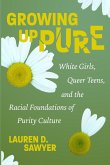Takes seriously youths' ownership of their sexual choices within purity culture Gaining mass popularity in the mid-1990s with the True Love Waits rally on the Washington Mall, purity culture began as an urge from evangelical conservatives for Christian adolescents to publicly commit to practicing abstinence until marriage. Throughout this decade and the next, millions of evangelical teenagers performed their commitment to sexual purity by signing pledges and wearing purity rings. This book examines the shaping of purity culture in the United States, looking specifically at the experiences of white youth. It shows that white girls and white queer youth were vulnerable to the purity movement, but that they were also complicit in its white supremacist oppressive structure. It makes the case that purity culture follows in the footsteps of other purity movements in the United States, and is very much tied to centuries of anti-Black racism and xenophobia in US social history, seeing white youth as in need of protection, usually from a racialized, sexualized other. While other works have focused on the ways in which purity culture has victimized young people, Sawyer argues that their perceived status as victims lets them too easily off the hook. White youth have been afforded the privilege of participating in purity culture's harmful behaviors without being called to account. Closely reading adolescents' stories of growing up in purity culture, she uncovers youth as agents, participants, and beneficiaries of its white supremacist framing, even as they were still vulnerable to its harmful teachings.
Bitte wählen Sie Ihr Anliegen aus.
Rechnungen
Retourenschein anfordern
Bestellstatus
Storno








